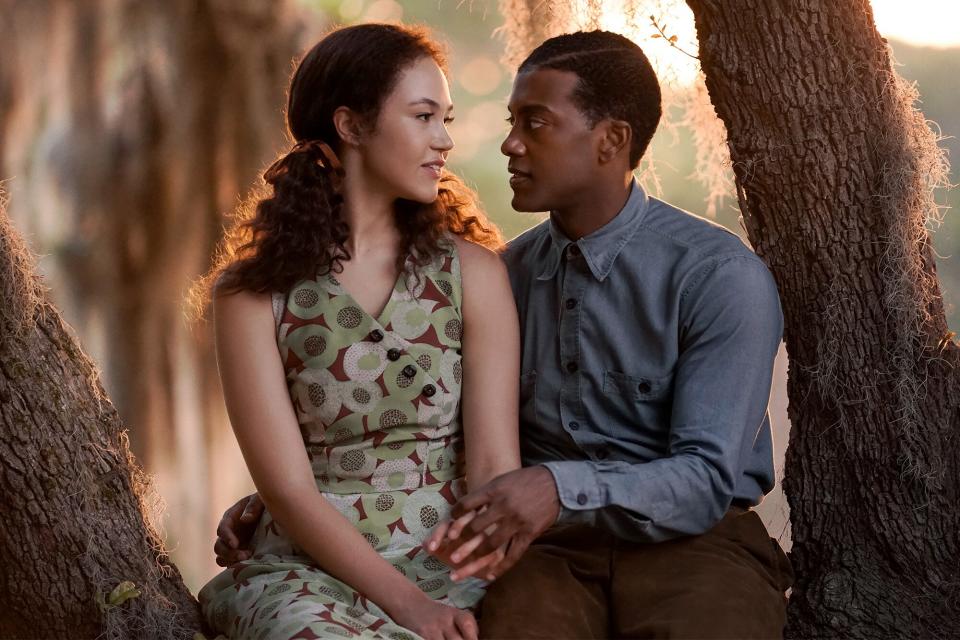Don't Worry Darling is stylish but hollow, while Players and Birdy get at the secret worlds of teens
Don't Worry Darling
In theaters now

Merrick Morton/Warner Bros.
Behold the plight of the new desperate housewife: She is trapped in something — a sitcom (Kevin Can F**k Himself), a metaverse (WandaVision), or like Florence Pugh's Alice in Don't Worry Darling, a sun-baked suburban idyll so dreamy, it's surely too good to be true. Unfortunately, she's also preceded by innumerable other films that have explored this black-mirror territory before: The Stepford Wives, Pleasantville, The Truman Show. That familiarity drains much of the tension and mystery from Darling, a movie high on snazzy midcentury style but considerably less bothered by the mechanics of cohesive storytelling.
In a world that looks like a glossy palm-tree-dotted cross between Norman Rockwell and Mad Men, Alice and Jack (the impish, dimpled pop star Harry Styles) are the envy of their friends, the kind of couple who can barely make it through a cocktail party or even breakfast without tearing each other's clothes off. They're well-off financially too, though the signifiers of their wealth — the impeccable wardrobe, the showcase home, the finned sedan gleaming in the driveway — match their neighbors' almost exactly; everyone's a winner here. That's because they're all part of some grand experiment called the Victory Project, helmed by a self-styled guru named Frank (Chris Pine, a wolf in Rat Pack clothing). Life in Victory is a retrograde Shangri-La, with very clear boundaries: you can love it, but you can't really leave it. Some, like Olivia Wilde's imperious Bunny and Frank's glacial, gorgeous wife (Eternals' Gemma Chan) are born for this gilded cage; Alice, alas, has questions, and she finds out just how alone she is once she starts asking them.
Wilde is also the director, and Darling is her darling: a polished candy-apple take on cracked utopia, encased in blinding Southern California sunlight and vintage pop ditties. Unlike her charmingly ramshackle 2019 debut Booksmart, though, the machinations here are more ambitiously story-driven, and as Darling goes along, the Edsel wheels, as it were, begin to come off. The red flags in Victory surface early and often, like voles on a country-club lawn: not just Frank's purring low-grade malevolence or the airplane that seems to fall out of a clear blue sky, but the jarring, jittery visions that surface like unwelcome late-night transmissions in Alice's mind. Pugh, the young British actress whose fierce emotional intelligence belies her doll-like prettiness in films like Midsommar and Little Women (for which she received her first Oscar nod), gives Alice as much inner life as the skittering screenplay allows, and Styles, at least, looks fantastic in a suit. But the movie, whatever its pile of ideas about love, gender constructs, and modern living, never really transcends Stepford mood-board pastiche. It's all nefarious and gorgeous, darling, and strictly nonsense in the end. Grade: B– —Leah Greenblatt
Players
Season 1 now streaming on Paramount+

Scott McDermott/Paramount+ Arrow Dong-Hyeon, Michael Miko Ahn, Misha Brooks, Da'Jour Jones, and Youngbin Chung, on 'Players'
The year's best TV surprise, this mockumentary from the American Vandal creators tracks the curious fall and attempted comeback of Fugitive Gaming, an esports team on the League of Legends circuit. Led by brash egomaniac Creamcheese (Misha Brooks), who at 27 is already ancient for his sport, Fugitive has never won a League championship. Then the team's corporate boss signs Organizm (Da'Jour Jones), a virtuoso teen player who barely speaks but just might be the greatest player of all time. So the show embodies a couple sacred sports narratives — the veteran-rookie rivalry, the underdogs with one last shot at the title — and also digs deep into the eccentric particulars of professional video gaming.
Flashbacks to Fugitive's 2016 glory days let Players paint a larger portrait of its entire subculture. And the cast of mostly unknowns is across-the-board great, especially Jones as a recessive-obsessive wunderkind and Brooks as a domineering dick with a lifetime of self-inflicted emotional wounds. I have no idea if Players is an authentic rendering of the esports world, because literally everything I know about esports I learned from Players. But here's a funny-thrilling saga about fallen dreams, new beginnings, the cultural gulf between millennials and Gen Z, predatory globo-capitalism, and old-fashioned teamwork. Grade: A —Darren Franich
Catherine Called Birdy
In theaters now; on Prime Video Oct. 7

ALEX BAILEY/Prime Video Bella Ramsey in 'Catherine Called Birdy.'
The entertainment options for girls who just want to have fun — and also, you know, fundamental rights — tend toward slim to none. So bless Catherine Called Birdy for bringing some genuine fresh air to a genre that too often feels either unduly sanitized or exhaustively market-tested for pop-culture curb appeal: a sly fairytale about a medieval tween that manages to be both cheeky and modern without losing its heart.
Catherine (Game of Thrones' Bella Ramsey), or "Birdy," as she prefers, is the sunny, pugnacious only daughter of the flittering libertine Lord Rollo (Andrew Scott) and his serene wife (Billie Piper) — a girl who would rather roll around in mud and run free with her best friend, Aelis (Metal Lords' Isis Hainsworth), than be beholden to some demure porcelain-figurine idea of what a future Lady should be. But the good lord is also seriously insolvent, and his only real collateral is Birdy; if he can get her wed to a wealthy-enough man, they might be able to hold on to their estate.
Birdy is bereft at the thought of leaving her home and her freedom to be some crusty aristocrat's child bride — she is, after all, only 14 — and so she duly begins to sabotage her hopeful suitors, among them Russell Brand and a crude barnyard yeti that everyone just calls "Shaggy Beard" (Paul Kaye). Rollo is rightfully furious at her shenanigans, though he's also a softie who frankly adores his insubordinate daughter, as does her mother ("I cheer for you, Birdy, but I fear for you"). Further complications arrive via her beloved cousin George (Joe Alwyn) and his own struggle to make the best of his betrothal to a loopy, much-older widow (Sophie Okonedo) amidst a burgeoning romance with Aelis.
These serious but mostly surmountable issues are relayed via Birdy's own endearingly unfiltered point of view, accompanied by confiding voiceovers and winsome, cheerfully anachronistic covers of '90s alt-pop (Mazzy Star, Supergrass). What could have been either hectic or cloying, though — in the vein of the recent Renaissance-Kill Bill redux The Princess or Netflix's winky revisionist remake of Persuasion — is played with so much disarming spunk and spirit, it consistently charms. That probably won't be news to fans of the bestselling 1994 YA novel of the same name on which Birdy is based, though some viewers may be surprised to learn who's behind its adaptation: Lena Dunham, who also wrote the screenplay. And they might be surprised, too, at how well she does it; the Girls auteur and early-aughts lightning rod seems fully at ease here in the firelight and tapestries of the 13th century, letting her gifted actors run wild with the absurdist comedy of the premise — Scott, a.k.a. Fleabag's erstwhile Hot Priest, is an MVP — without reverting to smash-cut chaos or tidy moralizing. "Old World Problems, New World Attitude" is the movie's maybe-too-cute tagline, but it rings true: This little bird leans in, and learns to fly. Grade: B+ —Leah Greenblatt
A Jazzman's Blues
On Netflix now

Jace Downs/NETFLIX
Tyler Perry is so famously prolific as a writer, director, actor, and producer — a billion-dollar one-man-brand with more stage and screen projects in his back pocket than most people have socks in their sock drawer — that it's almost hard to believe he hasn't made a proper drama until now.
A Jazzman's Blues, reportedly, is the story he's been waiting his whole career to tell: the first screenplay he ever completed back in 1995 after a fateful meeting with the revered playwright August Wilson, and one he's actively been trying to make for more than 15 years. Its setting goes back further still — a tale of race, class, and forbidden love set in the Jim Crow South of the 1940s, conceived in the lush, humid style of midcentury melodramas like Douglas Sirk's Written on the Wind or Imitation of Life.
Elegant newcomer Joshua Boone is Bayou, a young Black man in a small Louisiana township who makes the mistake of falling for a pretty girl named LeAnne (theater actress Solea Pfeiffer) who's light enough to pass for white, precariously. They're madly in love, but her scheming mother (Lana Young) — and the white men who run things — have other plans, and when the pitchforks come for him, Bayou sets out for Chicago with his erratic older brother Willie Earl (Austin Scott). Swiftly, he finds his place there as a singer in an upscale nightclub, while Willie carves out a lesser profile as a trumpeter. (They can perform center stage and sell out every night, as long as they stick to the service entrance.)
There are other complications — with the juke joint Bayou's beloved mother (Amirah Vann) has been left to run, and the bad stuff Willie Earl keeps shooting into his veins — that Jazzman unfurls between languid, hip-swaying musical numbers. In fact there isn't much the script doesn't throw at its characters, and Perry has a tendency to lead-foot his story beats, making villains cackle and sneer and spell out their worst intentions while his heroes stand apart, beatifically good and pure of heart. But he also has a way of making even the most telegraphed twists and overheated dialogue ring with conviction, a consummate entertainer to the end. Grade: B– —Leah Greenblatt
Related content:


